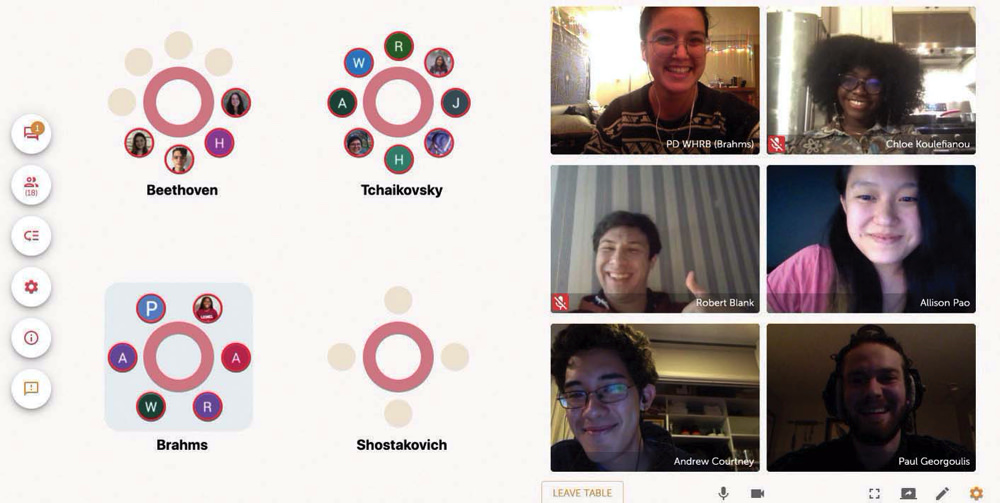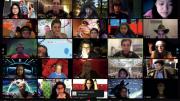Tune into WHRB, Harvard’s student-run radio station, just after midnight on a Sunday and you’ll hear the thumping bass of hip-hop, the staccato pulses of rap, and the soulful cadences of R&B. These beats, part of WHRB’s black music department, The Darker Side, comprise just a few hours of the station’s 24/7 lineup, which undergraduate DJs have typically broadcast live from its cozy studio in the basement of Pennypacker Hall.
But since COVID-19 closed campus, those DJs have had to pre-record programs and broadcast them remotely. They had the necessary infrastructure—used during winter recess, for example—but there was only so much pre-produced content already available, explained program director Katharine A.K. Courtemanche ’21. “So the question was: how are we going to continue to make, produce, and record remotely really high-quality air for such a long period of time?”
The answer? Solicit pre-produced content from its DJs and use platforms like Twitch, an online video-streaming service, to broadcast free, live shows with Boston-area artists. (Proceeds from optional donations went to movements including Black Lives Matter.) The virtual format brought unexpected successes, Courtemanche said. “At basically all of our Twitch events, we had way more [online attendees] than we would normally have at one of our standard live shows.”
As the pandemic reshapes Harvard life, extracurricular groups are affected, too. That hasn’t stopped undergraduates, with some College help, from keeping those vital communities active. Cultural affinity groups including the Asian American Association have organized online social events and reimbursed students for food and drink. The Outing Club has created guides to local recreation and organized virtual excursions and outdoor challenges. And The Harvard Crimson has become online-only until its staff can return to 14 Plympton Street.
But performance groups that rely on coordinated physical presence have had to work even harder. The Expressions Dance Company has temporarily replaced its biannual hip-hop show with a series of remote “werkshops,” teaching members original dance routines over Zoom, said student director Nina S. Uzoigwe ’21. It’s also added “Jigs ‘N Swigs,” social events that include rounds of Among Us, a popular multiplayer online game. CityStep, which recruits undergraduate volunteers to teach dance to fifth- through seventh-graders in Cambridge, has also debuted a virtual format. Because the group had to cancel its show last spring, it didn’t get a chance to bid farewell to its cohort of seventh-grade “graduates.” So, this year, it invited the now-eighth-graders to return, said student director Dara M. Badon ’22. The virtual format also enabled CityStep to include students as young as second-graders in its program.
The Harvard Choruses—the Harvard Glee Club, Radcliffe Choral Society, and Harvard-Radcliffe Collegium Musicum—continued to hold auditions despite initial apprehensions about whether they’d be able to operate remotely, according to music director and conductor Andrew G. Clark. “I think the first thing we had to ask ourselves is: should we continue? Or should we just kind of hibernate until it’s safe to be together again?”
Ultimately, the decision came down to recognizing singing as a means to survival. “People at Harvard sing for a lot of reasons, and one of the reasons they sing is to cope: to be with their close friends and be in relationship with one another,” Clark emphasized. “So, that was when we decided…we have to do this.” They held live auditions over Zoom, and offered prospects the option to submit an audition tape. Clark felt the process was “more compassionate” and “less competitive” than in-person auditions, which involve callbacks and social events that “feel like recruitment.”

Members of WHRB's classical music department hang out on the Harvard student-developed platform Congregate.
As for rehearsals, chorus members receive weekly assignments to record themselves singing; the conductors listen to the individual recordings and weave them together. “We’re able to give more specific and more direct individual feedback,” Clark said. Because participating in each chorus is an academic, for-credit music course, the choruses have received support from the College that has helped sustain staff positions, fund some of the technologies used, and send microphones to students. “I feel like [the College has] really stepped up to give us everything that we need,” said Clark, the course head for all three.
But going virtual still poses challenges. Benjamin P. Wenzelberg ’21, a co-music director for the Mozart Society Orchestra and vice president of arts at Harvard College Opera, said it has been nearly impossible for musicians to perform “synchronously and simultaneously” in a way that “really replicates what it’s like to make normal, in-person music with people.” Similarly, dance groups have found it challenging to teach choreography virtually because the webcam’s mirror effect complicates distinguishing left from right—and many dancers lack space to practice.
The practice-space problem illustrates how the pandemic has also raised issues of equity. Students are no longer in the same place with access to the same resources. To remedy this, Wenzelberg said his groups are taking an “inclusion first, innovation second” approach, because “everyone is spaced out across different time zones and has a different technology.” Meanwhile, many students living on campus, Clark said, “ironically are having a harder time participating than those who are at home. It’s not easy to sing at a certain volume in a dorm room with a suitemate next door trying to listen to an organic chemistry lecture.”
About 25 percent of an estimated 500 student organizations are “either taking a break or showing diminished levels of activity” this academic year, said Kate Colleran, assistant dean of student engagement and leadership. But hundreds have continued to recruit first-years. They took advantage of the College’s two-hour virtual activities fair in September—despite some technical difficulties. (“It literally did cut off at two hours,” said CityStep’s Badon. “People were mid-conversation and learning about opportunities” when the fair abruptly ended.)
“Zoom fatigue” is a factor. “It’s really difficult to have your whole life be in a computer screen,” said WHRB’s Courtemanche. Uzoigwe of Expressions attributed the attrition to students taking leaves of absence, an increase in course work as the semester progressed for those enrolled, and the sheer difficulty of generating excitement for extracurriculars virtually. Noting the challenges of reading body language over Zoom, she admitted that attendance at group events “hasn’t been that great.”
Still, new student groups have emerged because of the pandemic, like Connecting All, Reaching Everyone (CARE). Co-founded by Andrew Li ’22 and Kathryn Tian ’22 in late May, the group connects undergraduates (about 40 so far) with seniors in Boston-area assisted-living or nursing homes through weekly telephone or video calls. “I feel like it makes a big difference in seniors’ lives, especially since the pandemic affects them the most,” said Tian, whose project was sparked by caring for her grandmother. Li hopes their work will continue beyond the pandemic, in person or online.
And the leaders of some established groups have said they’re open to keeping adaptations they’ve made even after the pandemic subsides. Now, though, they’re focused on the present. Said Badon, “We’re just trying to do what we can and maximize the silver linings, which I guess is all you can hope for.”









